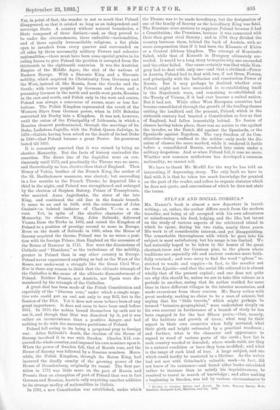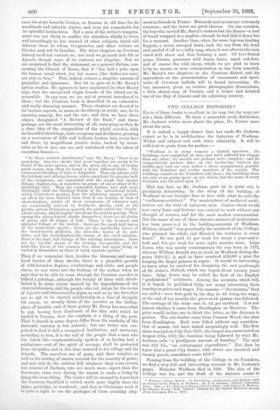SYLVAN AND SOCIAL CORSICA.* Mn. BARRY'S book is almost a
new departure in travel- writing ; or, rather, the author differs much from the modern traveller, not being at all occupied with his own adventures or misadventures, his food, lodging, and the like, but intent on the study of various aspects of the celebrated island in which he spent, during his two visits, nearly three years. His work is of considerable interest, and yet disappointing. The remarkable thoroughness with which he goes into his subject is most satisfactory, but his range is too limited. We had naturally hoped to be taken to the homes of the great chestnut-trees and the Corsican pine, to the places where traditions are especially rife and ancient customs more faith- fully retained ; and were sorry to find the word "sylvan" re- stricted to woods and coppice—in fact, to the macchia not far from Ajaceio—and that the social life referred to is almost wholly that of the present capital ; and one does not quite see why this should be, unless we are to take this volume as a prelude to another, seeing that its author resided for some time in three different villages in the interior mountains, and made excursions from these centres. Mr. Barry writes with great modesty, making no claim to be a man of science, but saying that his "little travels," which might perhaps be termed "botanico-geographical," were undertaken simply on his own account in furtherance of a branch of study he has been engaged in for the last fifteen years,—that, namely, of the habitats and growth of trees; what may be their aspect in their own countries when fully matured, what their girth and height estimated by a practical woodman ; and further, what is the character and appearance in regard to wood of various parts of the earth ; how far is each country wooded or denuded ; where woods exist, are they in a natural condition or have they been modified ; and what is the range of each kind of tree. A large subject, and one which could hardly be mastered in a lifetime. As the writer had not met with Grisebaeh's valuable work—in fact, did not know of its existence—and found other books calculated rather to increase than to satisfy his inquisitiveness, he resolved to travel in search of knowledge ; and after making a beginning in Sweden, was led by various circumstances to * Studios in Corsica, Sylvan and Social. By London r Sampson Low, Marston, Rad. Co, 1893, John Warren Barry, M.A. turn his steps towards Corsica, so famous in old time for its woodlands and valuable timber, and even yet remarkable for its splendid laricio-trees. But a man of the writer's tempera- ment was not likely to confine his attention wholly to trees, and accordingly he has treated of other subjects, which will interest those to whom Gregorovius and other writers on Corsica may not be familiar. His three chapters on Corsican history need not concern us ; nor need we go much into life at Ajaccio, though some of its customs are singular. But we are surprised to find the statement, as a general dictum, con- cerning the Church of Rome, that it "has laid a yoke upon the human mind which few but women [the italics are ours] are able to bear." This, indeed, evinces a singular amount of prejudice and ignorance. But let us pass on to Mr. Barry's sylvan studies. He appears to have acquiesced in what Maury says, that the unexplored virgin forests of the island are in- accessible. In any case, we are not at present introduced to them ; but the Corsican bush is described in an exhaustive and really charming manner. Three chapters are devoted to its various aspects, as moor, as shrubbery, as wood ; one, to its enemies, namely, fire and the axe ; and then we have three others, designated "A Review of the Bush," and these, perhaps, are the most interesting of all, conveying as they do a clear idea. of the composition of the whole' macchia, with its beautiful shrubbage, both evergreen and deciduous, growing on a succession of hills and hollows, broken into, every here and there, by magnificent granite rocks, backed by moun- tains as far as you can see, and embalmed with the odour of countless flowers :— " In these natural shrubberies," says Yr. Barry, "there is no monotony. Any two shrubs that grow together are rarely to be found of the same species, and in the space, let us say, of twenty yards square, may often be found a dozen different kinds. The consequent blending of tints is delightful. Thus, the plants with the leathery and shining leaves, which constitute the greater bulk of the evergreens, are contrasted with the rough and opaque foliage—lighter, too, in regard to its green—of one or other of the pervading eisti. They are contrasted further, and still more strikingly, with the feathery fronds of the arborescent heath, which, everywhere peeping from the glistening masses, produce an effect far more finished than that of our heather in beds of rhododendron; whilst all these evergreens, of whatever sort, are occasionally relieved by deciduous species, such as the prickly cytisus (Cairotome spinosa), the plant called the Pecita' (Rule viscose), and on higher elevations the prickly genista. Then among the glossy-leaved shrubs themselves, there are all shades of green, and all shapes of leaf. There is the bronzed and pinnated foliage of the loutish; there are the small dark leaves of the aristocratic myrtle ; there are the myrtle-like leaves of the broad-leaved phillyrea, the olive-like leaves of its pale sister, and the rhododendron-like leaves of the vivid arbutus ; there is the dark, full foliage of the retiring laurestinus ; there are the ivy-like shoots of the twining sarsaparilla, and the holly-like loaves of the common ilex, these last again being as varied in themselves as those of many separate species."
Then if we remember that, besides the blossoms and many- hued berries of these shrubs, there is a plentiful growth of wild-lavender, daphne, everlastings, and white and purple cistus, we can enter into the feelings of the author when he says that to be able to roam through the Corsican macchict is indeed a privilege, although the beauty of these wild shrub- beries is to some extent marred by the depredations of the charcoal-burners, and the people who cut cistus for the ovens of Ajaccio and briarwood for pipes, as well as by the fires that are so apt to be started accidentally in a time of drought. Of course, we usually think of the maeehia as the hiding- place ot bandits, and of these gentry Mr. Barry has somewhat to say, having been disabused of the idea with which be landed in Corsica, that the vendetta is a thing of the past. That it should in some degree differ from the vendetta of the sixteenth 'century is but natural ; but our writer was sur- prised to find it still a recognised institution, and moreover, according to him, it is the will of the people that a man who has taken life—euphemistically spoken of as having had a misfortune—out of the spirit of revenge, shall be protected from the police, and in due time restored to his village and his friends. The merciless use of guns, and their number, as well as the setting of snares, account for the scarcity of game ; and not only do the natives kill whatever they come across, but swarms of Italians, who are much more expert than the Corsicans, come over during the season to make a living by doing the same thing. The reader will be amused to learn that the Corsican blackbird is valued much more highly than the snipe, partridge, or woodcock ; and that in Christmas week it is quite a sight to see the packages of them awaiting ship- ment to friends in France. Buzzards and ravens are extremely common ; and the latter are great thieves. On one occasion, the boy who carried Mr. Barry's camera lost his dinner—a, loaf of bread wrapped in a napkin—though he had laid it down but for a moment. Another time, when the same boy was binding faggots, a raven swooped down, took the cap from his head and carried it off to a lofty crag, where it was afterwards seen cased with straw and, thus forming a nest. Of four-footed game, Corsica possesses wild boars, hares, small red-deer, and of course the wild sheep, which we are glad to learn is by no means so near extermination as has been asaerted. Mr. Barry's two chapters on the Corsican dialect, and his appendices on the pronunciation of consonants and speci- mens of Corsican ballads, will be found interesting. He has, moreover, given us various photographic illustrations, a little sketch-map of Corsica, and a larger and detailed one of the Bay of Ajaocio and the adjoining country.



































 Previous page
Previous page